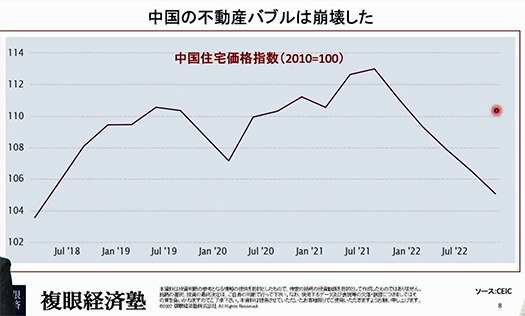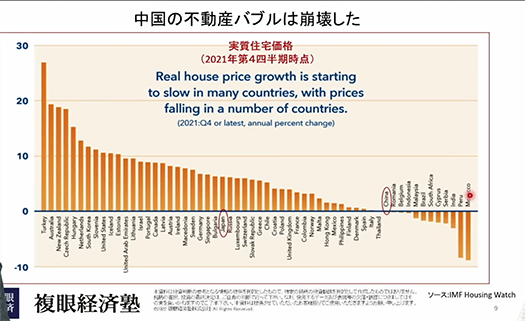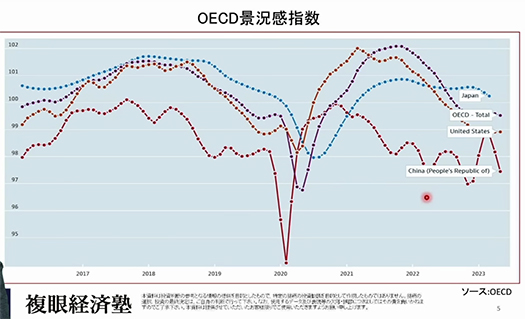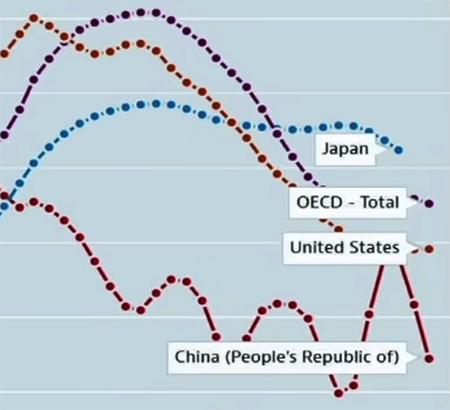

岡三証券が提供している動画番組に「複眼経済塾」というのがあって、ときどきチェックしています。最新の番組では「10ヵ月ぶりの利下げ!中国経済は窮地か? 」と題して公開されていた。公開10時間後で2.4万回視聴ということ。画面ショット画像はそちらからのものです。
いろいろ中国の不動産バブル崩壊とその世界的影響については懸念が高まっているけれど、独裁体制の国なのでとくに日本のマスメディアの報道ぶりは非常に迎合的になりやすく、危機感が伝わりにくくなっている。そういったなかでは経済系の専門チャンネルなどの方がわかりやすい。
中国は胡錦濤政権時にアメリカ発のリーマンショックからの世界経済の立ち直りのために国内不動産投資主導型の経済政策が功を奏して、世界経済復興の原動力になった。それ以降、改革開放政策の下、経済発展を遂げてきていたけれど、足下では中国のマンションの戸数はすでに全人口の3倍レベルになっていて、完全な供給過多。上の図では半期毎の中国の住宅価格指数で2010年を100とした2018-2022の推移。図では23年度の指数は予測になっていたけれど、急激な下落傾向は疑いがない。中国の発表する「国家統計局」発出の資料なので番組でも繰り返し、鵜呑みにはできないとは言及されていた。しかしそういうバイアスを掛けてもなお、中国経済の失速傾向は浮き彫りになってくる。
住宅の動向というのはかなり国内的な経済要因ということにはなるだろうけれど、世界の住宅関連マーケティングという意味合いからは、この影響は無視できない。よくアメリカがクシャミをすれば日本は肺炎になると戦後長く言われてきたけれど、世界の経済構造が相互依存型になって来ている中で、中国の経済状況がとくに日本経済へ影響がどう出てくるか、見極めが必要でしょうね。日本の大企業で影響を受けない企業はごく少数なのではないか。


一方でこちらは同動画で示されていたOECD景況感指数の経年変化ぶり。OECDはおおむね先進国の平均値と考えられるので、世界経済の中で日本だけが高水準に踏みとどまっている。日本の株価が上がってきていることの背景要因なのでしょう。アメリカの「デリスキング」の動き、経済安全保障の政策選択から中国を市場から除外していこうという動きは加速していく流れの中で、相対的に日本経済への信頼性が高まっている傾向を示しているのでしょう。
日本はバブル後、長い低迷期を経験していたけれどしかし体制の崩壊などは起こらず、平和的な環境は維持されてきた。高度成長からの軟着陸、はたして中国は可能なのだろうか?
English version⬇
How did China’s real estate bubble burst?
China’s economic development was effective in rebuilding the world economy after the Lehman Shock. However, a complete red light has been turned on for the abnormal real estate one-legged economy. What will be the impact? …
Okasan Securities offers a video program called “Compound Eye Economics School,” which I check out from time to time. The latest program is titled “Interest Rate Cut for the First Time in 10 Months! Is the Chinese Economy in Trouble? ” was published. It was viewed 24,000 times after 10 hours of publication. The screen shot image is from there.
There is growing concern about the bursting of China’s real estate bubble and its global impact, but because of the country’s dictatorship, the Japanese mass media in particular tends to be very compliant in its coverage, making it difficult to convey a sense of crisis. In such a situation, it is easier to understand the situation through specialized economic channels.
During the Hu Jintao administration, China’s real estate investment-led economic policies were successful in helping the world economy recover from the Lehman Shock that originated in the United States, and they became the driving force behind the global economic recovery. Since then, the economy has been developing under the reform and open-door policy, but at present, the number of condominium units in China is already at a level three times that of the total population, and there is a complete oversupply. The figure above shows the semi-annual housing price index in China for 2028-2022, with 2010 as 100. Although the index for FY23 was predicted in the chart, there is no doubt about the sharp downward trend. The data is from the National Bureau of Statistics of China, so it was repeatedly mentioned in the program that it should not be relied upon. However, even with this bias, the stalling trend of the Chinese economy comes into sharp relief.
Although housing trends are a domestic economic factor, we cannot ignore the impact of this trend in terms of global housing-related marketing. It has long been said that if the U.S. sneezes, Japan will catch pneumonia. As the world’s economic structure is becoming more interdependent, it will be necessary to assess how the economic situation in China will affect the Japanese economy in particular. There are probably very few large Japanese companies that will not be affected.
On the other hand, this is the OECD Business Confidence Index, which was shown in the same video, and since the OECD is generally considered to be an average of developed countries, only Japan has remained at a high level in the world economy. This is probably a background factor for the rising stock prices in Japan. The U.S. move to “derisk” and exclude China from the market in terms of economic security policy choices is probably an indication of the trend of increasing relative confidence in the Japanese economy amid the accelerating trend.
Japan experienced a long period of stagnation after the bubble economy, but the system did not collapse and a peaceful environment was maintained. Is a soft landing from high growth in China really possible?
Posted on 6月 23rd, 2023 by 三木 奎吾
Filed under: 住宅マーケティング







コメントを投稿
「※誹謗中傷や、悪意のある書き込み、営利目的などのコメントを防ぐために、投稿された全てのコメントは一時的に保留されますのでご了承ください。」
You must be logged in to post a comment.